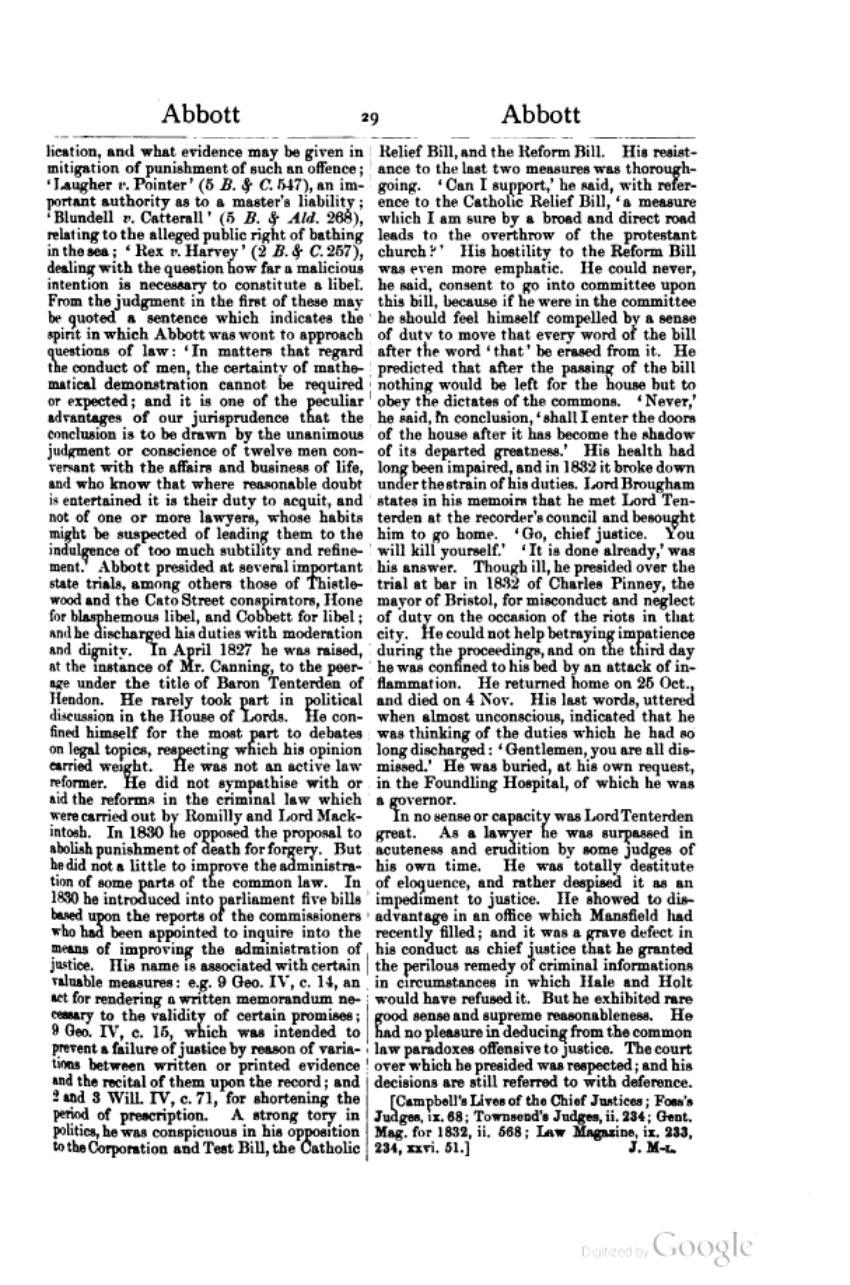lication, and what evidence may be given in mitigation of punishment of such an offence; ‘Laugher v. Pointer’ (5 B. & C. 547), an important authority as to a master's liability; ‘Blundell v. Catterall’ (5 B. & Ald. 268), relating to the alleged public right of bathing in the sea; ‘Rex v. Harvey’ (2 B. & C. 257), dealing with the question how far a malicious intention is necessary to constitute a libel. From the judgment in the first of these may be quoted a sentence which indicates the spirit in which Abbott was wont to approach questions of law: ‘In matters that regard the conduct of men, the certainty of mathematical demonstration cannot be required or expected; and it is one of the peculiar advantages of our jurisprudence that the conclusion is to be drawn by the unanimous judgment or conscience of twelve men conversant with the affairs and business of life, and who know that where reasonable doubt is entertained it is their duty to acquit, and not of one or more lawyers, whose habits might be suspected of leading them to the indulgence of too much subtility and refinement.’ Abbott presided at several important state trials, among others those of Thistlewood and the Cato Street conspirators, Hone for blasphemous libel, and Cobbett for libel; and he discharged his duties with moderation and dignity. In April 1827 he was raised, at the instance of Mr. Canning, to the peerage under the title of Baron Tenterden of Hendon. He rarely took part in political discussion in the House of Lords. He confined himself for the most part to debates on legal topics, respecting which his opinion carried weight. He was not an active law reformer. He did not sympathise with or aid the reforms in the criminal law which were carried out by Romilly and Lord Mackintosh. In 1830 he opposed the proposal to abolish punishment of death for forgery. But he did not a little to improve the administration of some parts of the common law. In 1830 he introduced into parliament five bills based upon the reports of the commissioners who had been appointed to inquire into the means of improving the administration of justice. His name is associated with certain valuable measures: e.g. 9 Geo. IV, c. 14, an act for rendering a written memorandum necessary to the validity of certain promises; 9 Geo. IV, c. 15, which was intended to prevent a failure of justice by reason of variations between written or printed evidence and the recital of them upon the record; and 2 and 3 Will. IV, c. 71, for shortening the period of prescription. A strong tory in politics, he was conspicuous in his opposition to the Corporation and Test Bill, the Catholic Relief Bill, and the Reform Bill. His resistance to the last two measures was thoroughgoing. ‘Can I support,’ he said, with reference to the Catholic Relief Bill, ‘a measure which I am sure by a broad and direct road leads to the overthrow of the protestant church?’ His hostility to the Reform Bill was even more emphatic. He could never, he said, consent to go into committee upon this bill, because if he were in the committee he should feel himself compelled by a sense of duty to move that every word of the bill after the word ‘that’ be erased from it. He predicted that after the passing of the bill nothing would be left for the house but to obey the dictates of the commons. ‘Never,’ he said, in conclusion, ‘shall I enter the doors of the house after it has become the shadow of its departed greatness.’ His health had long been impaired, and in 1832 it broke down under the strain of his duties. Lord Brougham states in his memoirs that he met Lord Tenterden at the recorder's council and besought him to go home. ‘Go, chief justice. You will kill yourself.’ ‘It is done already,’ was his answer. Though ill, he presided over the trial at bar in 1832 of Charles Pinney, the mayor of Bristol, for misconduct and neglect of duty on the occasion of the riots in that city. He could not help betraying impatience during the proceedings, and on the third day he was confined to his bed by an attack of inflammation. He returned home on 25 Oct., and died on 4 Nov. His last words, uttered when almost unconscious, indicated that he was thinking of the duties which he had so long discharged: ‘Gentlemen, you are all dismissed.’ He was buried, at his own request, in the Foundling Hospital, of which he was a governor.
In no sense or capacity was Lord Tenterden great. As a lawyer he was surpassed in acuteness and erudition by some judges of his own time. He was totally destitute of eloquence, and rather despised it as an impediment to justice. He showed to disadvantage in an office which Mansfield had recently filled; and it was a grave defect in his conduct as chief justice that he granted the perilous remedy of criminal informations in circumstances in which Hale and Holt would have refused it. But he exhibited rare good sense and supreme reasonableness. He had no pleasure in deducing from the common law paradoxes offensive to justice. The court over which he presided was respected; and his decisions are still referred to with deference.
[Campbell's Lives of the Chief Justices; Foss's Judges, ix. 68; Townsend's Judges, ii. 234; Gent. Mag. for 1832, ii. 568; Law Magazine, ix. 233, 234, xxvi. 51.]
